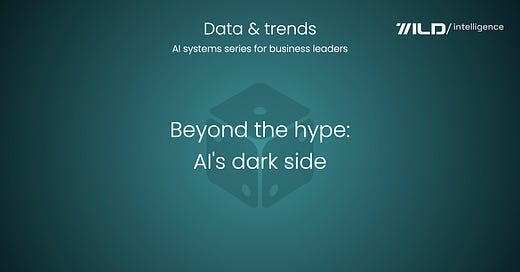🎲 Beyond the hype: AI's dark side
AI data and trends for business leaders | AI systems series
The market, burgeoning with innovation, is projected to reach staggering heights, with an estimated value of $184 billion by 2024 and a competitive landscape populated by over 70,000 startups.
Yet, beneath this gilded exterior lies a complex interplay of challenges that threaten to impede progress.
Data, the lifeblood of AI, is simultaneously its greatest asset and its most formidable obstacle. While vast quantities of data are essential for training sophisticated models, ensuring their quality, privacy, and unbiased nature is a formidable challenge.
The risk of perpetuating societal biases through algorithms is a specter haunting the industry, demanding rigorous ethical scrutiny.
Concurrently, the AI ecosystem faces a critical talent shortage. The demand for skilled AI professionals far outstrips supply, creating a hyper-competitive landscape where attracting and retaining top talent is paramount.
The economic implications of this imbalance are profound, with potential consequences for innovation and economic growth.
Again, the ethical implications of AI cannot be overstated. As algorithms increasingly influence decision-making processes, questions of transparency, accountability, and the potential for job displacement loom large.
Navigating the complex regulatory landscape while fostering innovation is a delicate balancing act that will shape the future of AI.
Who shoulders the true cost of cyber-insecurity for dominant corporations?
Let’s try to better understand through facts.
📌 Insight 1: Data quality, privacy, and bias
The alarming rate of data science project failures due to poor quality underscores the critical need for data hygiene.
Data quality: A staggering 80% of data science projects fail due to poor data quality (Gartner). This highlights the critical need for robust data cleaning and validation processes.
Data privacy: With increasing regulations like GDPR and CCPA, the cost of data breaches has soared. A single breach can cost a company an average of $4.35 million (IBM).
AI bias: Studies have shown that AI systems can reflect societal biases. For instance, facial recognition systems have been found to be less accurate for people of color, leading to discriminatory outcomes.
▸ Moreover, the specter of data breaches casts a long shadow, threatening not only financial stability but also reputational damage. Perhaps most concerning is the insidious nature of AI bias, which can amplify societal inequities and erode public trust in technology.
These interconnected issues demand a holistic approach, prioritizing data quality, privacy, and fairness from the outset. Ultimately, AI's success and ethical integrity rest on the soundness of the data that fuels it.
📌 Insight 2: Talent acquisition and retention
The AI gold rush has triggered a frantic scramble for talent, creating a hyper-competitive landscape reminiscent of the dot-com era. The exorbitant salaries and relentless poaching reflect the premium placed on AI expertise.
Talent shortage: There's a global shortage of AI talent, with an estimated 300,000 open AI-related jobs (LinkedIn).
High salaries: Competition for AI talent is fierce, driving up salaries. The average salary for an AI engineer in the US is around $171,000 (Glassdoor).
Retention challenges: AI professionals are often lured by higher salaries or exciting new projects, leading to high turnover rates.
▸ However, this talent arms race is a short-sighted strategy. True innovation thrives on collaboration, knowledge sharing, and long-term cultivation of talent.
Organizations focusing solely on acquiring talent without investing in their growth and development risk creating a hollowed-out workforce. Sustainable success in AI demands a shift from a predatory mindset to a nurturing one, fostering a culture of learning and innovation.
📌 Insight 3: Ethical considerations and regulation
Today, more than ever, AI stands at a crossroads, poised to redefine our world but haunted by the specter of unchecked power. The absence of a robust regulatory framework has created a Wild West environment, where ethical dilemmas abound, and public trust dwindles.
Lack of regulation: While AI is rapidly advancing, the regulatory framework is still evolving, creating uncertainty for businesses and consumers.
Ethical dilemmas: AI systems can make life-or-death decisions, raising complex ethical questions. For example, self-driving cars must decide who to protect in an accident.
Public trust: Concerns about AI's impact on jobs and society have eroded public trust. Building trust requires transparency and accountability.
AI systems capable of life-or-death decisions demand a level of accountability that is currently lacking. As we grapple with the potential for mass job displacement and the amplification of societal biases through algorithms, it becomes clear that AI is not merely a technological advancement but a profound societal challenge.
The path forward requires a delicate balance between innovation and regulation, with a steadfast commitment to transparency, fairness, and human well-being.
📌 What’s next and considerations
The convergence of data challenges, talent scarcity, and ethical dilemmas presents a complex puzzle for the AI industry. A multifaceted approach is essential to unlock the full potential of AI while mitigating its risks.
Data is the bedrock, but it must be fortified. Beyond mere volume, data quality, privacy, and fairness are paramount. Investing in robust data governance, advanced analytics, and ethical frameworks is not just a compliance exercise but a strategic imperative.
Talent is the catalyst, but it requires nurturing. Pursuing AI talent cannot be a zero-sum game. Organizations must foster a culture of learning, innovation, and collaboration. This includes investing in employee development, promoting diversity and inclusion, and building strong employer brands.
Ethics is the compass, but it needs a roadmap. As AI systems become increasingly sophisticated, the ethical implications deepen. A proactive approach to responsible AI is crucial. This involves developing transparent and explainable models, conducting rigorous impact assessments, and engaging with stakeholders to build trust.
Looking ahead, several key considerations emerge:
Global cooperation: AI is a global phenomenon demanding international collaboration on standards, regulations, and best practices.
Human-centric AI: Ensuring that AI serves humanity requires a focus on augmenting human capabilities rather than replacing them.
Education and literacy: Preparing the workforce and society for an AI-driven future necessitates widespread AI education and literacy.
Long-term vision: The AI landscape is rapidly evolving. Organizations must develop long-term strategies that anticipate future challenges and opportunities.
The road to responsible and beneficial AI is fraught with challenges but is also a path of immense potential. By addressing the interconnected issues of data, talent, and ethics, we can harness AI's power to improve society.
Continue exploring
AI dystopia series | The genesis: a flawed utopia
Video by Google DeepMind Hello, The world is in intense motion. Technological advancements, geopolitical shifts, and global challenges are reshaping the landscape of international relations. As leaders and board members, it's crucial to understand the potential futures of our highly technological and multicultural society and their implications for your organization.
🎲 Data and trends
This email is sent to you because you signed up for Wild Intelligence by Yael Rozencwajg. Thank you for your interest in our newsletter!
Data and trends are part of Wild Intelligence, as well as its approaches and strategies.
We share tips to help you lead, launch, and grow your sustainable enterprise.
Become a premium member, and get our tools to start building your AI-based enterprise.




